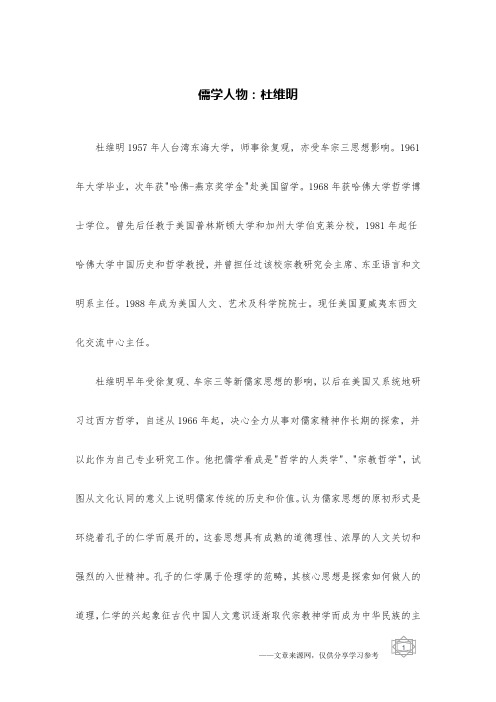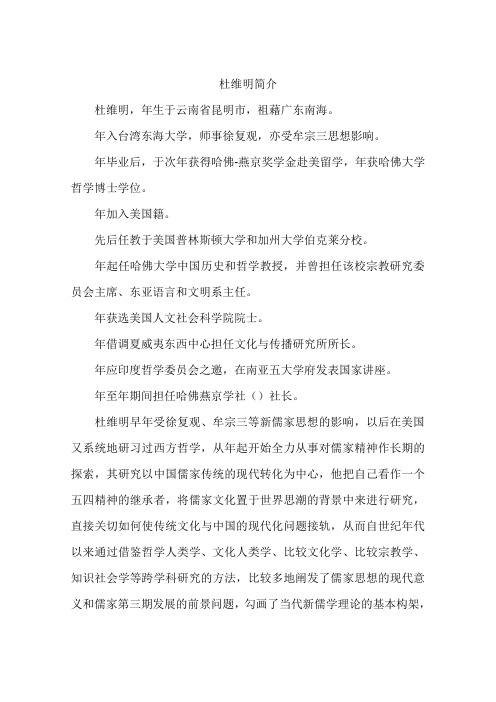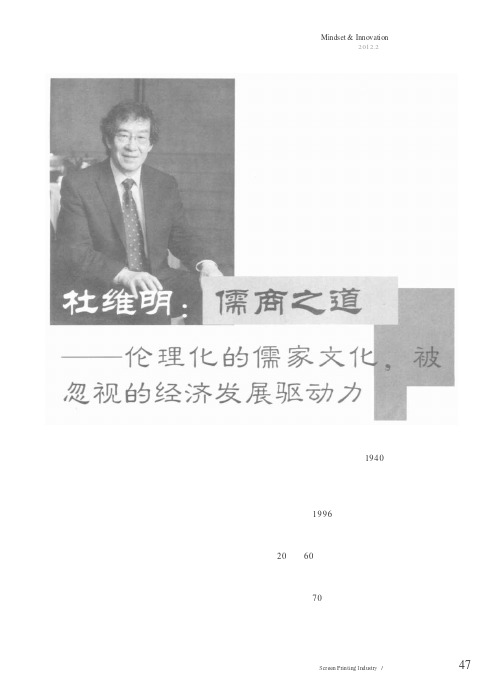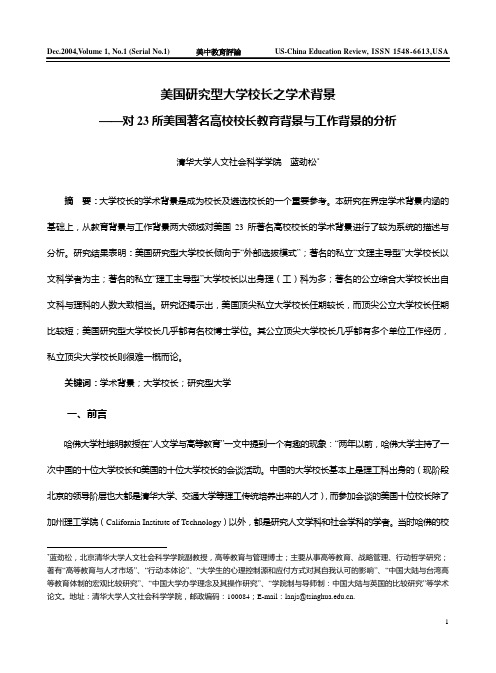杜维明英文简介
- 格式:pdf
- 大小:43.54 KB
- 文档页数:8

儒学人物:杜维明杜维明1957年人台湾东海大学,师事徐复观,亦受牟宗三思想影响。
1961年大学毕业,次年获"哈佛-燕京奖学金"赴美国留学。
1968年获哈佛大学哲学博士学位。
曾先后任教于美国普林斯顿大学和加州大学伯克莱分校,1981年起任哈佛大学中国历史和哲学教授,并曾担任过该校宗教研究会主席、东亚语言和文明系主任。
1988年成为美国人文、艺术及科学院院士。
现任美国夏威夷东西文化交流中心主任。
杜维明早年受徐复观、牟宗三等新儒家思想的影响,以后在美国又系统地研习过西方哲学,自述从1966年起,决心全力从事对儒家精神作长期的探索,并以此作为自己专业研究工作。
他把儒学看成是"哲学的人类学"、"宗教哲学",试图从文化认同的意义上说明儒家传统的历史和价值。
认为儒家思想的原初形式是环绕着孔子的仁学而展开的,这套思想具有成熟的道德理性、浓厚的人文关切和强烈的入世精神。
孔子的仁学属于伦理学的范畴,其核心思想是探索如何做人的道理,仁学的兴起象征古代中国人文意识逐渐取代宗教神学而成为中华民族的主导思想。
儒学具有"道统"、"学统"和"政统",是可以转化社会政治和道德的精神源泉。
他指出,应该区分"儒家传统"和"儒教中国",前者是一种涵盖性很强的人文主义精神,具有历久长新的恒常价值;后者是以政治化的儒家伦理为主导思想的中国传统封建社会的意识形态,是封建遗毒;"五四"新文化运动批判的实际上是"儒教中国",从对"儒家传统"的发扬来说这种批判是有利的。
他发挥牟宗三关于儒学发展的"三期说"理论,提出了"儒学第三期发展的前景"问题。
认为从先秦到西汉是儒学发展的第一期,他用雅斯贝斯的"轴心时代"的理论来说明这一期儒学出现和发展的原因;宋元明清是儒学发展的第二期,它的出现是针对佛教文化挑战的"一个创造性的回应",并用岛田虔次的说法指出这一期儒学是东亚文明的集中体现;而第三期儒学的发展,则是对西方文化"挑战的回应,认为儒学在二十一世纪是否还有生命力,主要取决于儒学是否能经过纽约、巴黎、东京最后回到中国,儒学只有在这些文化中生根,才能以康庄的姿态回到中国,他的估计是有可能的。

杜维明简介杜维明,年生于云南省昆明市,祖藉广东南海。
年入台湾东海大学,师事徐复观,亦受牟宗三思想影响。
年毕业后,于次年获得哈佛-燕京奖学金赴美留学,年获哈佛大学哲学博士学位。
年加入美国籍。
先后任教于美国普林斯顿大学和加州大学伯克莱分校。
年起任哈佛大学中国历史和哲学教授,并曾担任该校宗教研究委员会主席、东亚语言和文明系主任。
年获选美国人文社会科学院院士。
年借调夏威夷东西中心担任文化与传播研究所所长。
年应印度哲学委员会之邀,在南亚五大学府发表国家讲座。
年至年期间担任哈佛燕京学社()社长。
杜维明早年受徐复观、牟宗三等新儒家思想的影响,以后在美国又系统地研习过西方哲学,从年起开始全力从事对儒家精神作长期的探索,其研究以中国儒家传统的现代转化为中心,他把自己看作一个五四精神的继承者,将儒家文化置于世界思潮的背景中来进行研究,直接关切如何使传统文化与中国的现代化问题接轨,从而自世纪年代以来通过借鉴哲学人类学、文化人类学、比较文化学、比较宗教学、知识社会学等跨学科研究的方法,比较多地阐发了儒家思想的现代意义和儒家第三期发展的前景问题,勾画了当代新儒学理论的基本构架,在东亚和西方世界产生了相当的影响,从而被称为当代新儒家的代表,出版英文著作部,中文著作部,发表论文数百篇。
主要著作有《今日儒家伦理》、《人性与自我修养》、《儒家思想:创造转化的人格》、《新加坡的挑战》等。
由于其杰出的贡献,在年和年分别荣获第九届国际’研究奖和联合国颁发的生态宗教奖等奖项。
杜维明自述:在台湾的中学时代因受周文杰老师的启蒙而走上诠释儒家传统的学术道路,而在东海大学亲炙牟宗三和徐复观的教诲才是促使我体悟探究儒家人文精神的本质理由,尔后负笈哈佛,以比较思想史为范围集中探索儒学传统的核心价值。
此后,他抱定志向据此为业,经过了三十多年的风雨兼程,矢志不渝地探究、注释、传播儒家文化。
杜维明将自身思想的发展分为三个阶段:第一阶段,从学术起步到七十年代上半期,他决心鼓起心力对儒家的精神价值作长期的探索,以此作为自己专业上的承诺。


2012.2Mindset &InnovationS I y 网印工业杜维明,祖籍广东南海,1940年出生于昆明,现为长江商学院名誉教授、长江商学院人文委员会主席。
现任哈佛大学讲座教授,中央研究院文哲所顾问委员会主席,达沃斯世界经济论坛成员,联合国推动文明对话杰出人士小组成员,并自1996年出任燕京学社社长至今。
因为在“新儒学”研究上的杰出贡献,杜维明教授被誉为世界级“新儒学大师”。
在20世纪60年代,大多数东西方学者都认为儒家思想与现代化无法兼容。
他们的主要依据是,儒家强调和谐、协作、集体和社会稳定,与西方基于个人主义的经济伦理不符。
到了70年代末期,日本、韩国、中国台湾、中国香港和新加坡经济飞跃发展,人们不得不质疑早期的——伦理化的儒家文化,被忽视的经济发展驱动力47creen Printing ndustr /2012.2Mindset &Innovation网印工业S I y假定。
越来越多的人感到,其间必有另一种伦理在起作用。
杜维明在研究日韩现代化的过程中发现,东亚有可能探索出新的经济发展模式。
在日韩经济发展过程中,儒家文化发挥了导引和调节的作用。
更具体地说,儒家传统重视全才教育,提倡上下同心协力,培养刻苦耐劳的工作伦理,强调为后代造福的习惯,这些文化基因为人们树立了一个东亚企业精神的典范。
他清醒地意识到,儒家伦理与经济成功之间没有狭窄的特定的因果关系,但儒家伦理对东亚的新型资本主义做出了贡献。
日本著名管理学家伊藤肇认为:“日本实业家能够各据一方,使战败后的日本经济迅速复兴,中国儒商文化的影响力功应居首。
许多学者研究后发现,中国儒商的管理思想的长处往往正是西方商人管理中所欠缺的地方。
”虽然与西方的工作伦理基本一致,但儒家理论与“强调个人权利意识的新教伦理”具有截然不同的趋向。
儒家理论基本点是对“责任感”的强调:“自我是各种关系的一个中心。
它倡导的不是个人主义,而是我们对一个更大的实体的承诺。

美国研究型大学校长之学术背景——对23所美国著名高校校长教育背景与工作背景的分析清华大学人文社会科学学院蓝劲松*摘要:大学校长的学术背景是成为校长及遴选校长的一个重要参考。
本研究在界定学术背景内涵的基础上,从教育背景与工作背景两大领域对美国23所著名高校校长的学术背景进行了较为系统的描述与分析。
研究结果表明:美国研究型大学校长倾向于―外部选拔模式‖;著名的私立―文理主导型‖大学校长以文科学者为主;著名的私立―理工主导型‖大学校长以出身理(工)科为多;著名的公立综合大学校长出自文科与理科的人数大致相当。
研究还揭示出,美国顶尖私立大学校长任期较长,而顶尖公立大学校长任期比较短;美国研究型大学校长几乎都有名校博士学位。
其公立顶尖大学校长几乎都有多个单位工作经历,私立顶尖大学校长则很难一概而论。
关键词:学术背景;大学校长;研究型大学一、前言哈佛大学杜维明教授在―人文学与高等教育‖一文中提到一个有趣的现象:―两年以前,哈佛大学主持了一次中国的十位大学校长和美国的十位大学校长的会谈活动。
中国的大学校长基本上是理工科出身的(现阶段北京的领导阶层也大都是清华大学、交通大学等理工传统培养出来的人才),而参加会谈的美国十位校长除了加州理工学院(California Institute of Technology)以外,都是研究人文学科和社会学科的学者。
当时哈佛的校*蓝劲松,北京清华大学人文社会科学学院副教授,高等教育与管理博士;主要从事高等教育、战略管理、行动哲学研究;著有―高等教育与人才市场‖、―行动本体论‖、―大学生的心理控制源和应付方式对其自我认可的影响‖、―中国大陆与台湾高等教育体制的宏观比较研究‖、―中国大学办学理念及其操作研究‖、―学院制与导师制:中国大陆与英国的比较研究‖等学术论文。
地址:清华大学人文社会科学学院,邮政编码:100084;E-mail:lanjs@.1长陆登廷(Neil Rudenstein)是研究英国文学的,斯坦福大学的校长加斯帕(Gerhard Gasper)是研究法学的,耶鲁大学的校长列文(Richard Levin)是研究经济的,而哥伦比亚大学的校长瑞普(George Rupp)却是一位神学家。

一、曾仕强:中国式管理大师,全球华人中国式管理第一人现任:中华企管网集团首席顾问华夏智业管理学院院长曾任:台湾交通大学教授台湾兴国管理学院院长学历:英国牛津大学管理哲学荣誉博士英国莱斯特大学管理哲学博士美国杜鲁门大学行政管理硕士国立台湾师范大学教育学士学位民生报调查为交大最受学生欢迎教授之一生产力中心调查为最受企业界人士欢迎十大名嘴之一应邀新加坡、马来西亚、印尼、泰国、香港、中国大陆演讲企业管理,在台湾主讲千次以上。
二、成中英:专研中国管理哲学,C理论的创始人现任:美国夏威夷大学教授美国东西方大学校长国际中国哲学学会荣誉会长国际易经学会会长1935年生于南京,祖籍湖北省阳新县。
于1956年毕业于台湾大学,1963年获哈佛大学哲学博士学位,七○年代曾为台大哲学系教授兼主任,后应邀赴夏威夷大学任教至今,被称为“第三代新儒学代表人物”。
成中英教授现任国际中国哲学会荣誉会长,国际易经学会主席,国际儒学联合会副理事长等职务,并担任耶鲁大学、牛津大学、台湾大学、北京大学等十余所大学的客座教授。
他学贯中西,长期从事逻辑与语言哲学、科学哲学、管理哲学、易经哲学、儒学与新儒学等方面的研究,是C理论的创始人。
他在哲学的专业领域是中西哲学会通、儒家哲学及本体诠释学,其治学的基本思路是:深入西方哲学的核心,宏扬中国哲学的精华,推动融合中国哲学的世界哲学的创立。
著有《美国哲学归纳法理论研究》、《戴震原善研究》、《中国哲学与中国文化》、《科学真理与人类价值》、《合外内之道:儒家哲学论》《C理论:中国管理哲学》等,发表学术论文近百篇。
三、杜维明:新儒学第三代领军人物杜维明,祖籍广东南海,1940年出生于昆明,1961年毕业于台湾东海大学,1962年获哈佛燕京学社奖学金后前往哈佛大学深造。
在哈佛相继取得硕士、博士学位,先后任教于普林斯顿大学、柏克莱加州大学,1981年至今任教于哈佛大学。
1988年,杜维明获选美国人文社会科学院院士,现任哈佛大学讲座教授,中央研究院文哲所顾问委员会主席,达沃斯世界经济论坛成员,联合国推动文明对话杰出人士小组成员,并自1996年出任燕京学社社长至今。
杜维明弘扬儒学的华人学者2008-01-28 19:43:00 作者: 来源:齐鲁文化研究中心杜维明:弘扬儒学的华人学者2008-01-23张晓哲任成琦人民日报海外版杜维明当笔者问如何理解费孝通先生提出的“各美其美,美人之美,美美与共,天下大同”时,杜维明又一次兴奋起来:“太好了!我认为这是人类文明对话的典范,是人类的最高理想。
”时值北京论坛(2007)在北大燕园召开,“人类文明的多元发展模式”正是讨论的热点。
如此看来,他还是一个学者,一个兼具儒家情怀和国际视野的华人文化学者。
尽管他的身上有多重的光环,比如美国人文社会科学院院士,哈佛大学教授,台湾“中央研究院”文哲所顾问委员会主席,达沃斯世界经济论坛成员,联合国推动文明对话杰出人士小组成员,同时自1996年出任哈佛大学燕京学社社长至今。
与时俱进他在全球的讲坛间奔走,从港台大陆到新加坡、马来西亚,从东京到巴黎、温哥华,还有新德里、开普敦、斯德哥尔摩……作为国际汉学界和当代新儒家的代表人物之一,杜维明说他在“传道”,在“宣传”儒学。
“其实我的心愿是不断深入地了解儒家,通过了解、认识来发挥它的资源”。
杜维明说他对自己的定位是“扎根在儒家传统的资源里,从事比较有创造性的哲学思考。
”所以,“如果说我是一个思想家或者哲学家,我很荣耀。
”他把自己“看作一个‘五四精神’的继承者”,将儒家文化置于世界思潮的背景中来进行研究,直接关切如何使传统文化与中国的现代化问题接轨。
他反复强调,知识分子要有一种人文关怀,能够在一个公共领域内对政策和社会发展作出积极的贡献,有责任感,能参与社会文化,代表着一种社会良知,比如对弱势群体的关注,对环境问题的关心等等。
杜维明继儒学名家唐君毅、徐复观、牟宗三之后,以研究中国儒家传统的现代转化为中心。
他将儒教中国与儒家传统区分,使“儒学复兴说”成为当时文化讨论中的一派显学。
从一定意义上说,现代新儒学在中国大陆绝响30年后重新引起人们的注意和兴趣,与杜维明是分不开的。
儒学的当代使命时间:2009年11月27日15:00——17:00地点:深圳市图书馆五楼报告厅主讲人:杜维明主持人:尊敬的各位来宾、女士们、先生们、同学们大家好!今天下午我们非常荣幸的在读书论坛请来哈佛大学的杜维明教授,给我们做“儒学的当代使命”的演讲。
我先简单的介绍一下杜先生,杜维明教授祖籍广东南海,生于云南昆明,在60年代初毕业于台湾东海大学,之后到美国留学,然后在哈佛大学先后取得硕士和博士学位。
先后在美国的普林斯顿大学、美国加州大学柏克莱分校任教,从1981年开始,杜先生就回到哈佛大学任教,他先后担任过哈佛大学宗教研究委员会主席、哈佛大学东亚系主任,从1996年开始,他出任哈佛燕京学社的社长,所以杜先生在哈佛大学也是非常知名的资深教授。
杜维明教授80年代以来,跟大陆的学术界有非常广泛的交往,杜先生作为一个国际的知名学者,作为当代儒学的主要代表人物,20多年他在思想界可以说有非常大的影响。
80年代开始,他所开创的一些论域,一直影响到国内和国际学术界的话题。
比如说儒学创新、儒学三期发展、工业东亚,这些话题在80年代是非常引人注目的。
90年代以来,关于文明对话、文化中国、全球伦理、启蒙反思,这些话题也都和杜维明教授有非常密切的关系。
从90年代后期以来,杜先生又关心儒学与宗教、儒学与生态环保、儒学与人权、儒学与政治自由主义、儒学与新马克思主义、儒学与女性主义,以及全球伦理对话。
杜先生全身心致力于儒学的创造性诠释和儒学现代化的多项工作中,他不仅在哈佛大学传道授业解惑,影响了众多西方的学者,同时他也风尘仆仆的往来于北美、欧洲、东亚、南亚,在很多地区,在很多大学都留下了他的影响和印记。
杜先生作为当代最有活力的著名的思想家,他不光是开拓了在西方的儒学论述空间,并且把国际前沿最新的思想传输到中土。
所以杜先生在当代可以说是一个儒家型公共知识分子的典范。
集学术研究、人材培养、人文关怀、社会参与于一身。
他在当代的世界前沿很多论题都有精辟的论述和见解。
一、曾仕强:中国式管理大师,全球华人中国式管理第一人现任:中华企管网集团首席顾问华夏智业管理学院院长曾任:台湾交通大学教授台湾兴国管理学院院长学历:英国牛津大学管理哲学荣誉博士英国莱斯特大学管理哲学博士美国杜鲁门大学行政管理硕士国立台湾师范大学教育学士学位民生报调查为交大最受学生欢迎教授之一生产力中心调查为最受企业界人士欢迎十大名嘴之一应邀新加坡、马来西亚、印尼、泰国、香港、中国大陆演讲企业管理,在台湾主讲千次以上。
二、成中英:专研中国管理哲学,C理论的创始人现任:美国夏威夷大学教授美国东西方大学校长国际中国哲学学会荣誉会长国际易经学会会长1935年生于南京,祖籍湖北省阳新县。
于1956年毕业于台湾大学,1963年获哈佛大学哲学博士学位,七○年代曾为台大哲学系教授兼主任,后应邀赴夏威夷大学任教至今,被称为“第三代新儒学代表人物”。
成中英教授现任国际中国哲学会荣誉会长,国际易经学会主席,国际儒学联合会副理事长等职务,并担任耶鲁大学、牛津大学、台湾大学、北京大学等十余所大学的客座教授。
他学贯中西,长期从事逻辑与语言哲学、科学哲学、管理哲学、易经哲学、儒学与新儒学等方面的研究,是C理论的创始人。
他在哲学的专业领域是中西哲学会通、儒家哲学及本体诠释学,其治学的基本思路是:深入西方哲学的核心,宏扬中国哲学的精华,推动融合中国哲学的世界哲学的创立。
著有《美国哲学归纳法理论研究》、《戴震原善研究》、《中国哲学与中国文化》、《科学真理与人类价值》、《合外内之道:儒家哲学论》《C理论:中国管理哲学》等,发表学术论文近百篇。
三、杜维明:新儒学第三代领军人物杜维明,祖籍广东南海,1940年出生于昆明,1961年毕业于台湾东海大学,1962年获哈佛燕京学社奖学金后前往哈佛大学深造。
在哈佛相继取得硕士、博士学位,先后任教于普林斯顿大学、柏克莱加州大学,1981年至今任教于哈佛大学。
1988年,杜维明获选美国人文社会科学院院士,现任哈佛大学讲座教授,中央研究院文哲所顾问委员会主席,达沃斯世界经济论坛成员,联合国推动文明对话杰出人士小组成员,并自1996年出任燕京学社社长至今。
介绍杜威全英文作文英文:Dewey is a prominent American philosopher, psychologist, and educational reformer who lived from 1859 to 1952. He is best known for his contributions to the field of education, particularly his emphasis on experiential learning and the importance of education in promoting democracy.One of Dewey's key ideas was that education should be focused on the needs and interests of the student, rather than on rote memorization or the transmission of knowledge from teacher to student. He believed that students shouldbe encouraged to learn through experience, by engaging in hands-on activities and by reflecting on their experiences.Dewey also believed that education should be closelytied to the needs of society, and that schools should play an active role in shaping the values and beliefs of young people. He argued that education was essential for creatingan informed and engaged citizenry, and that it was the responsibility of schools to prepare students for active participation in democratic society.In addition to his work in education, Dewey also made significant contributions to the fields of philosophy and psychology. He was a leading figure in the development of the philosophy of pragmatism, which emphasizes thepractical consequences of ideas and actions. He also helped to develop the field of functional psychology, which focuses on the ways in which mental processes help individuals adapt to their environment.Overall, Dewey's ideas have had a profound impact on American education and on the broader fields of philosophy and psychology. His emphasis on experiential learning and the importance of education in promoting democracy continue to influence educators and policymakers today.中文:杜威是一位著名的美国哲学家、心理学家和教育改革家,生于1859年,逝于1952年。
Curriculum Vitae - Tu WeimingThis is the curriculum vitae for Professor Tu Weiming. For more information, please consult the other sections of the web site on his teaching, writings, lectures, activities, and projects.Present PositionDirector of the Harvard-Yenching InstituteHarvard-Yenching Professor of Chinese History and Philosophy and of Confucian Studies,Department of East Asian Languages and Civilizations, Harvard UniversityPersonal DetailsBorn: February 1940Place of Birth: Kunming, ChinaCitizenship: Naturalized U.S. Citizen, 1976Address: 2 Divinity Ave, Cambridge, MA 02138Phone: (617) 495-3369Fax: (617) 495-7798E-mail: wtu@Web page: /~wtu/EducationB.A. in Chinese Studies, Tunghai University, Taiwan, 1961M.A. in Regional Studies -- East Asia, Harvard University, 1963Ph.D. in History and East Asian Languages, Harvard University, 1968Main Appointments1966-1967: Lecturer in the Humanities, Tunghai University, Taiwan.1968-1971: Assistant Professor in East Asian Studies, Princeton University.1971-1981: Successively Assistant Professor, Associate Professor and Professor of History, University of Californiaat Berkeley.1981-: Professor of Chinese History and Philosophy, Harvard University.1983-1986: Chairman, Committee on the Study of Religion, Harvard University.1986-1989: Chairman, Department of East Asian Languages and Civilization, Harvard University.1996-: Director, Harvard-Yenching Institute.1999-: Honored as the Harvard-Yenching Professor of Chinese History and Philosophy and of Confucian Studies, Harvard University. It is the first time that a professorship is named on “Confucian Studies” in the English-speaking world.Selected Other Appointments1981-: Chair, Harvard Seminar in Confucian Studies.1984-1992: Overseas Member of Board of Directors, Institute of East Asian Philosophy, Singapore.1988-: Fellow, American Academy of Arts and Sciences.1990: Visiting Professor at L'Ecole Practique des Haute Etudes, Paris.1990-1991: Director, Institute of Culture and Communication, East-West Center, Hawaii.1993-: Co-chair, Seminar on “The Chinese in the Global Community,” Aspen Institute1995-: Chair, Advisory Board of the Institute of Chinese Literature and Philosophy, Academia Sinica, Taiwan.1997-: Member of the International Advisory Panel, Centre for Civilisational Dialogue, University of Malaya.1998- 2001: Member of the Advisory Committee to the Program Committee of the Eastern Section of American Philosophical Association.1998- 2000: Member of the International Advisory Panel, Faculty of Arts and Sciences, National University of Singapore.2000-: Member of the International Advisory Council of Toda Institute2001: Group of Eminent Person, the United NationResearch InterestsConfucian Humanism, Confucian Critique of Enlightenment Mentality, theories of modernity, Chinese history and philosophy, and civilizational dialogue. A major proponent of the “Third Epoch of Confucian humanism” and the idea of "Cultural China," which attempts to understand what it means to be Chinese within a world context, Dr. Tu is currently interpreting Confucian ethics as a spiritual resource for the emerging global community.English PublicationsTraditional China (editor, with James T. C. Liu), Englewood Cliffs, N.J: Prentice-Hall, 1970.Neo-Confucian Thought in Action: Wang Yang-ming's Youth (Based on dissertation The Quest for Self-realization; A Study of Wang Yang-ming's Formative Years, 1472-1509, 1968), Berkeley: University of California Press, 1976; Korean translation, 1994.Centrality and Commonality: An Essay on Chung-yung, Honolulu : University Press of Hawaii, 1976.Centrality and Commonality: An Essay on Confucian Religiousness (A revised and enlarged edition of Centrality and Commonality: An Essay on Chung-yung), Albany: SUNY, 1989; Chinese translation, 1999 (China).Humanity and Self-Cultivation, Berkeley: Asian Humanities Press, 1979; Boston: Cheng & Tsui Company, 1998; Chinese translation, 1988 (China) & 1992 (Taiwan).Confucian Ethics Today: The Singapore Challenge, Singapore: Federal Publications, 1984; Chinese translation, 1989 (China).Confucian Thought: Selfhood as Creative Transformation, Albany: SUNY, 1985; Chinese translation, 1991 (China) & 1997 (Taiwan).The Way, Learning and Politics in Classical Confucian Humanism, Singapore: Institute of East Asian Philosophies, 1985.Confucianism in A Historical Perspective, Singapore: Institute of East Asian Philosophies, 1989.The Triadic Chord: Confucian Ethics, Industrial East Asia, and Max Weber : Proceedings of the 1987 Singapore Conference on Confucian Ethics and the Modernization of Industrial East Asia (editor), Singapore: Institute of East Asian Philosophies, 1991.Way, Learning and Politics: Essays on the Confucian Intellectual, Singapore: Federal Publications, 1989; Albany: SUNY, 1993.The Confucian World Observed: A Contemporary Discussion of Confucian Humanism in East Asia, (editor, with Milan Hejtmanek and Alan Wachman), Honolulu: East-West Center, 1991.The Living Tree: Changing Meaning of Being Chinese Today (editor), Stanford University Press, 1994.China in Transformation (editor), Harvard University Press, 1994.A Confucian Perspective on Human Rights: The Inaugural Wu Teh Yao Memorial Lectures 1995, Singapore: The Centre for the Arts of National University of Singapore, 1996.Confucian Traditions in East Asian Modernity: Exploring Moral Education and Economic Culture in Japan and the Four Mini-Dragons (editor), Harvard University Press, 1996.Confucianism and Human Rights (editor, with Wm. Theodore de Bary), New York: Columbia University Press, 1998.The Humanities and the Public Intellectual (An essay prepared for Creative America, a report by the President’s Committee on the Arts and the Humanities), Washington, D.C.: President’s Committee on the Arts and the Humanities, 1998.Confucianism Spirituality (editor, with Mary Evelyn Tucker), Volume 11 of “World Spirituality: An Encyclopedic History of the Religious Quest” Series, New York: Crossroad (forthcoming in 2002).Dr. Tu’s publications in English also include more than 100 English articles and book chapters. For a complete list of his English publications, visit /~wtu/. His article “Humanities and the Public Intellectual” will be included in Creative America, an official report of the U.S. President’s Committee on the Arts and the Humanities.Major Chinese PublicationsSannian de Xu Ai (Three Years’ Cultural Reflection in America), Taipei: Zhiwen Press, 1970.Renwen Xinling de Zhendang (Cultivation of the Heart-and-Mind) Taipei: Shibao Publishing Company, 1976.Ruxue di Sanqi Fazhan de Qianjing Wenti (The “Third Epoch” of Confucian Humanism), Taipei: Lianjing Press, 1989.Rujia Ziwo Yishi de Fansi (Reflection on Confucian Consciousness), Taipei: Lianjing Press, 1990.Rujia Chuantong de Xiandai Zhuanhua (Modern Transformation of Confucian Tradition), ed. Yue Hua, Beijing: Zhongguo Guangbo Dianshi Press, 1992.Wenhua Zhongguo yu Rujia Chuantong (Cultural China and Confucian Tradition), Singapore: National Singapore University Press, 1996.Xiandai Jingsheng yu Rujia Chuantong (Modernity and Confucian Tradition), Taipei: Lianjing Press, 1996; Beijing: Sanlian Publishers, 1997Yiyang Laifu (An Anthology of Tu Weiming), ed. Chen Yinchi, Shanghai: Shanghai Wenyi Press, 1997.Ruxue Fazhan de Hongguan Toushi (Essays on the Development of Confucianism), editor, Taipei: Zhengzhong Press, 1997.Bainian Zhongguo Zhexue Jingdian (20th Century Chinese Philosophy), editor (with Tang Yijie), Shenzhen: Haitian Press, 1998.Du Weiming Xueshu Wenhua Suibi (Anthology of Tu Weiming), ed. Cheng Man-lung, Beijing: Zhongguo Qingnian Press, 1999.Wenhua Zhongguo de Renzhi yu Guanhuai (Cultural China: Issues and Concerns), Taichung: Tunghai University Center for General Education, 1999.Shinian Jiyuan Dai Ruxue (East Asian Values and Confucianism), Hong Kong: Oxford University Press, 1999Du Weiming Wenji (The Collective Works of Du Weiming, eds. Guo Qiyong & Zheng Wenlong, 5 Volumes), Wuhan: Wuhan Publishing House, 2002.Dr. Tu’s publications in Chinese include four monographs (translated from English) and more than 100 articles. Dr. Tu is widely anthologized as one of the leading exponents of New Confucianism in China, Taiwan, Hong Kong, and Singapore.Selected LecturesThe Annual Freeman Lectureship, Wesleyan University, 1982.Keynote Speaker, The Academy of Chinese Culture, Beijing, 1985.Fulbright Lecturer, Peking University, 1985.(Tenth) Ch'ien Mu Lecturer, New Asia College, The Chinese University of Hong Kong, 1988.(First) L. Cha Lecturer, Hong Kong University, 1988.The Commencement Speaker, Graduate Theological Union, Berkeley, 1990.GET Lecturer on Technology and Ethics, Ball State University, 1991.Paul Desjardins Memorial Lecturer, Haverford College, 1992.William Oliver Martin Memorial Lecturer, Rhode Island University, 1993.Baccalaureate Speaker, Swarthmore College, 1993.Distinguished Lecturer, North Carolina State University, 1993.The Wood Lecturer, Vassar College, 1994.Chuan Lyu Lecturer, University of Cambridge, 1994.Keynote Speaker at the Plenary Session, Seventh East-West Philosophers' Conference, Honolulu, January 1995.Keynote Speaker, Islamic-Confucian Dialogue, University of Malaya, March 1995.Invited Guest Speaker, the Social Policy and Social Progress: United Nations' Social Summit on Social Development, Copenhagen, March 6-12, 1995.Inaugural Lecture in Memorial of Wu Teh Yao, Singapore National University, March 1995.Inaugural Lecture in Memorial of Wu Teh Yao, Tunghai University (Taiwan), March 21, 1995.National Lecturer, sponsored by the Indian Council of Philosophical Research; delivered 16 lectures under the general rubric of "A Confucian Critique of the Enlightenment Mentality"; lectures were given at New Delhi, Madras, Santineketan, Lucknow, and Vanarasi, November 24-December 14, 1995.Reischauer Lecturer, Fairbank Center for East Asian Research, Harvard University, April, 1996.Foerster Lecturer, University of California at Berkeley, September 17-19, 1996.Duval Lecturer, New Mexico State University, December 5, 1996.Green Visiting Professorship, University of British Columbia, March 1997.Eugene Burke Lecturer, University of California at San Diego, April 1997.Wing-tsit Chan Lecturer, University of Hawaii at Honolulu, January 23, 1998.Keynote Speaker at the Plenary Session, World Congress of Philosophy, Boston, August, 1998.Inaugural Lecture of Yuelu Academy Lecture series, October 17, 1999.Inaugural Lecture of Henry Y. H. Fong Lecture in Chinese Studies, University of Victoria, October 20, 1999.The Fengqi Lectures in East China Normal University, October 2001.The Tasan Lectures, Korea, November 2001.Selected Articles“The Context of Dialogue: Globalization and Diversity” in Crossing the Divide: Dialogue among Civilizations (New Jersey: Seton Hall University, 2001)Confucianism Spirituality (editor, with Mary Evelyn Tucker), Volume 11 of “World Spirituality: An Encyclopedic History of the Religious Quest” Series, New York: Crossroad (forthcoming in 2002).Foreword to Ultimate Realities, Robert C. Neville (Albany, N.Y.: State University of New York Press, 2001).Forward to Harvard-Yenching Library Rare Books Collection (August 2001)Tu Weiming jiaoshou fangtanlu (An interview with Professor Tu Weiming, compiled by Xu Jianxin) in Zhongwai wenhua yu wenlun (Vol. 8, pp.54-87, Chengdu: Sichuan Education Publishing House, 2001)Tu Weiming xueshu zhuanti fangtanlu: the Spirit of Zongzhou Philosophy and the future of Confucian culture (Dongfangsuo and Tu Weiming, Shanghai: Fudan University Press, 2001)“Confucian Humanism and Dialogue among Civilizations” in Collection of Speeches in Chinese Universities (Vol. 2, Kewen Publishing House, 2001)“Humanism and Global Ethics” in Collection of Speeches in Chinese Universities (Vol. 3, Kewen Publishing House, 2001)Foreword to Mairu ershiyi shiji de zhuzi xue (The Zhuxi Studies in the twentieth-first Century) (Shanghai: East China Normal University, 2001)“The Global Significance of Local Knowledge: New Perspective on Confucian Humanism” in Sungkyun Journal of East Asian Studies (Vol. 1, No. 1, August 2001)“Yi T’oegye’s Intellectual Self-definition: An exploration” in T’oegye’s Life and Thought, and the World and the Future: the 17th International Conference on T’oegye Studies (The International Toegyehak Society, 2001)“The Ecological Turn in New Confucian Humanism: Implication for China and the World” in Daedalus (Journal of the American Academy of Arts and Sciences, Fall 2001)“Confucianism and Liberalism” in Dao: A Journal of Comparative Literature (Vol. II, No. 1, Winter 2002), pp. 1-20.“The Implication of Local Knowledge for Global Ethics (Bentu zhishi de pushi yiyi)” in Dialogue among Civilizations: Global implication of local knowledge (Shanghai Foreign Language Education Press, 2002, pp. 7-10).Confucianism Spirituality (editor, with Mary Evelyn Tucker), Volume 11 of “World Spirituality: An Encyclopedic History of the Religious Quest” Series, New York: Crossroad (forthcoming in 2003).“Confucianism and Civilization” in Dialogue of Civilizations: A New Peace Agenda for a New Millinnium (eds. Majid Tehranian and David W. Chappell (London: I.B Tauris, 2002, pp. 83-90)“Dialogue among Civilizations: the message of China’s rise to the world” in Dongyin qiusuo (Search in Japan) (Beijing: Social Sciences Document Publication House, 2003)“On the Transition of Chinese Traditional Culture” in The Nankai Journal (Tianjin: Nankai University, Vol. 3, 2002), pp. 1-13.“Globalization and the Dialogue among Civilizations” in Open Times (Guangzhou: Guangzhou Academy of Social Sciences, Vol. 1, 2002), pp. 123-131.。